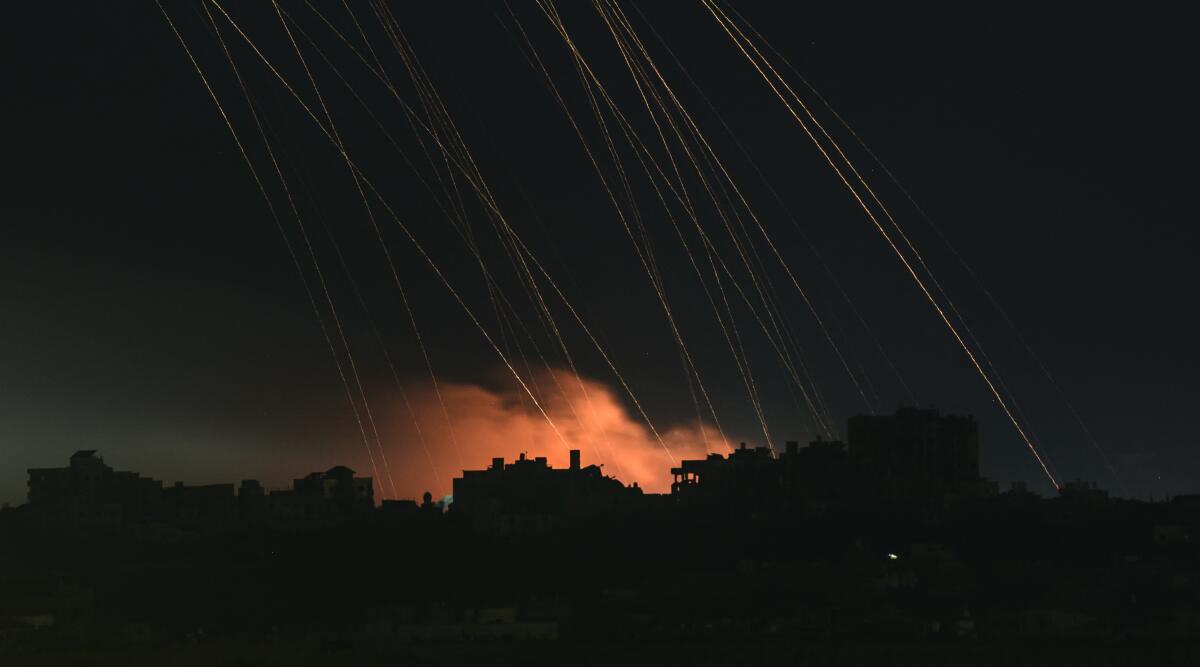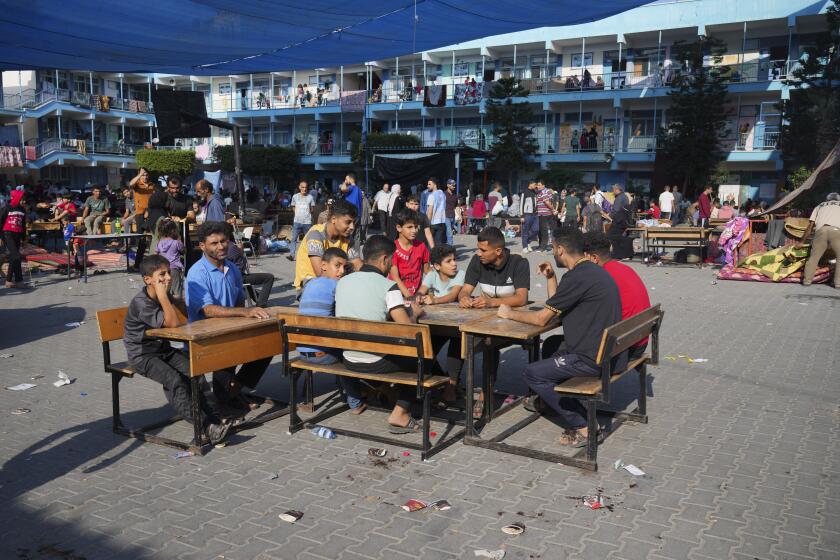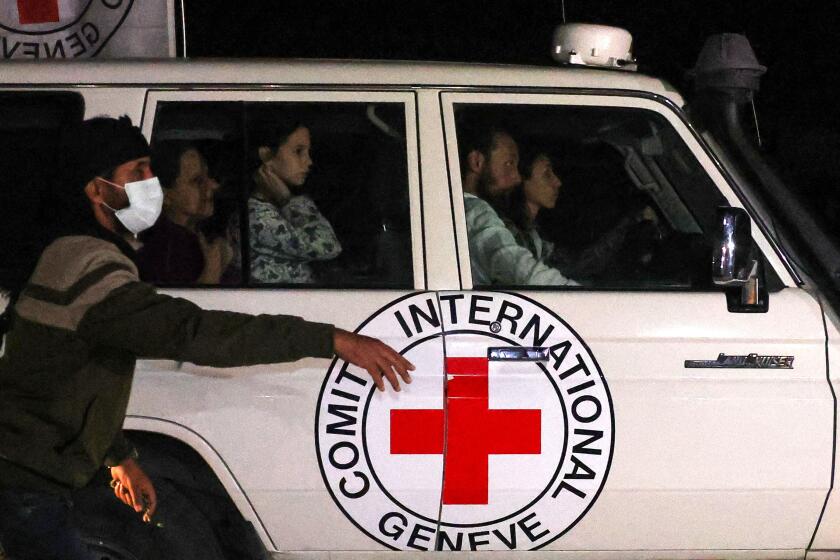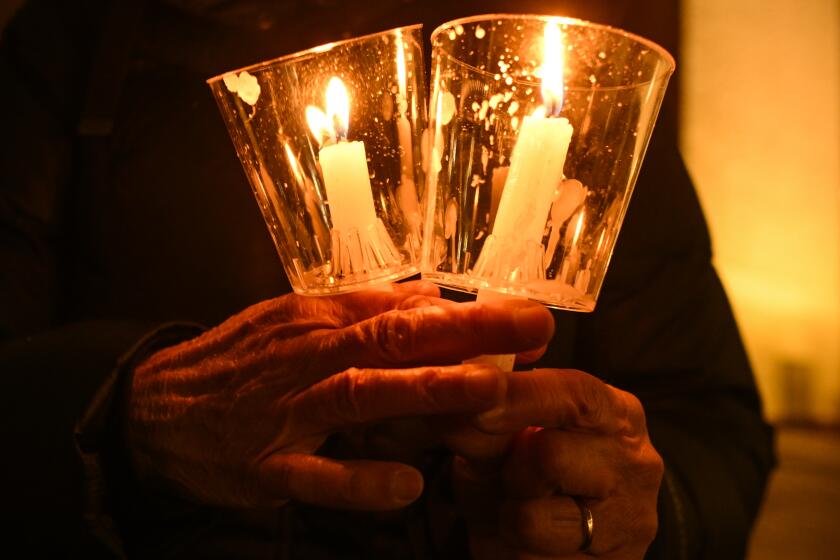Opinion: A play about Gaza won awards in Israel. No theater would dare mount it now

In 2015, I directed the American premiere of an Israeli play that grapples with Gaza — a play I could never direct today.
Gilad Evron’s “Ulysses on Bottles” centers on Izakov, a Jewish Israeli lawyer representing two clients: a Palestinian teacher, nicknamed Ulysses, arrested by Israel for trying to reach Gaza on a raft made of plastic bottles in hopes of bringing Russian literature to the strip, and an Israeli defense official, Seinfeld, seeking advice about whether Israel’s blockade of Gaza could implicate the country in crimes against humanity.
With 20,000 dead in Israel’s bombing of Gaza, we feel compelled to prove our humanity. We have been denied agency as a people.
The world premiere of the play in Israel in 2012 wasn’t easy to produce. A Jewish actor declined the title role, fearing he’d be blacklisted from commercial work. Eventually the role went to a Palestinian citizen of Israel. Still, the production ran for more than 80 performances and won Israel’s top theater prize for best original play that year.
When I directed “Ulysses” three years later in Boston, in a translation by Evan Fallenberg, I knew it would shake up audiences. I too was challenged by what the play brought up: Israelis’ daily indifference to the Gaza siege, which their government hoped would weaken Hamas’ rule but instead became a cruel policy of collective punishment.
My own discomfort is exactly why I wanted to do the play. Theater allows us to confront hard facts in a way that is provocative but ambiguous. It can make big issues intimate, and it doesn’t force you to make up your mind, only to watch and wrestle.
Reaction to the Boston production could be summed up in one comment: great art but unsettling. Tickets sold out for the majority of the run, but my theater company, Israeli Stage, lost funders and audiences. The head of Boston’s Jewish federation never came to another of our productions, and his organization reduced its sponsorship of our work. The consul general of Israel in Boston summoned me to his office and told me to put on other plays instead.
President Biden marked the 100th day in captivity for hostages of Hamas without mentioning the 24,000 Palestinians killed by Israel in that time.
The morning of Hamas’ attack on Oct. 7, feeling helpless and scared, I reread the play.
Here is an excerpt from the most difficult scene in the play, in which Seinfeld confesses his deepest fears to Izakov: that the population in Gaza will boom, diseases and misery will multiply and the blockade will explode in Israelis’ faces:
Seinfeld: Imagine 10 million people who can’t get out, who can barely move, who are infected and starved and scorched. … The fear no longer stops anyone. To live or to die — they don’t see the difference. And they come and overtake us. And then what, lawyer Izakov? I shoot them at the border and I shoot them as they continue to advance and rise up; they grow in numbers and I keep shooting. … Thousands? Millions? How many? Till when?
The play seems prophetic today. Fear of death didn’t stop Hamas from flooding into Israel and killing 1,200 people and taking more than 200 people hostage. Now as nearly 2 million Palestinians are displaced inside Gaza, fleeing Israeli bombardment, disease is rampant and famine looms.
And as Seinfeld predicts, we continue shooting. Gaza health officials say more than 24,000 Palestinians have been killed by Israel’s military, 10,000 of whom are children. Who knows how many more will be killed. “Thousands? Millions? How many?”
By feeling forced to pick a side, the whole world is now experiencing what has been my life struggle — deciding whether I’m Israeli or Palestinian (and getting backlash for whichever I choose).
As a director, I want to speak in the way I know best, to ask people to come to the theater and see what a play like “Ulysses on Bottles” has to say. But where could it be staged today?
I couldn’t put it on in Germany. There, it would be attacked as antisemitic. A week into the Israel-Hamas war, Berlin’s leading theater, the Maxim Gorki Theatre, postponed performances of “The Situation,” a play by Israeli director-playwright Yael Ronen that explores the third generation of Germans, Israelis and Palestinians whose families survived the Holocaust and Nakba.
I couldn’t put it on in the U.S. Theaters there would certainly fear the loss of support from Jewish audiences and benefactors. And for those who want to hear about Palestinian suffering, what an Israeli playwright has to say about Gaza would never do. In November, I asked a producer at a university theater company in Boston if he’d put on a reading of the play. He said the university president had forbidden productions or statements about Gaza on stage.
And Israel? No Israeli theater would dare put on this play now. I was texting with someone at the theater that originally produced it, and I asked whether they’d mount it now. The conversation ended; there was no response.
South Africa made compelling arguments in its case charging Israel with genocide in Gaza. But the court should also weigh the ongoing threat of Hamas.
In fact, Gaza disappeared from the Israeli theater a long time ago. “Ulysses on Bottles” was the last major Israeli play to reckon with Gaza, and that was 12 years ago. Israeli theater, attended by a staggering 40% of the population, is harnessed by the state: Many actors come up through the military’s performing troupes, and all theaters rely on public funding. When theaters criticize Israeli policy, or explore taboo topics such as the occupation or the Nakba, their funding may be cut or conditioned by the ministry of culture.
During the last two decades of Israel’s rightward drift, theater professionals have self-censored to survive, a situation made worse now. I know an actress who was suspended from teaching at an acting studio because she posted about Palestinian suffering that predated Oct. 7. In November, Jerusalem’s municipal theater dropped a play by an Afghan-British playwright about his family’s exile from Afghanistan because he tweeted about the “Gaza genocide.” “We cannot celebrate the work of this writer,” the theater’s manager said in a news release.
There’s a scene in “Ulysses on Bottles” where Izakov tries to convince Ulysses to sign an agreement that he won’t set sail for Gaza ever again, in exchange for his freedom from jail:
Izakov: Sign the agreement and that’s that! … Enough throwing your life away on something so insubstantial, so completely groundless. …Stop being some parody, some extinct species that nobody is interested in or knows anything about. Your anonymity is complete. The theater is empty. There are no protest movements, there’s no echo, the square is empty. Go home!
The squares in Israel do feel empty. Antiwar protests are made up of a hundred protesters at best. The theaters are full but with plays that serve as distractions from war. There’s no place where an Israeli director can put Gaza center stage and ask audiences to come to terms with their inaction in the face of an endless cycle of violence. As things stand, Ulysses can’t even dream of setting sail.
Guy Ben-Aharon is an Israeli American theater director who divides his time between Boston and Jaffa, Israel. For nine years, he ran Israeli Stage based in Boston. He is also the founder and executive director of the Jar in Boston, an organization that uses the arts to create diverse communities.
More to Read
A cure for the common opinion
Get thought-provoking perspectives with our weekly newsletter.
You may occasionally receive promotional content from the Los Angeles Times.














